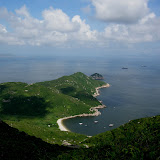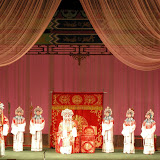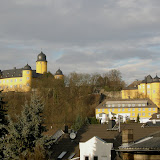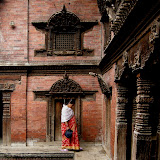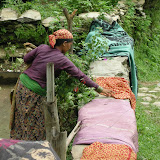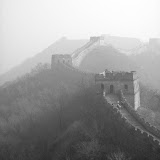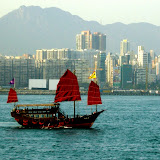七月七日是卢沟桥事变爆发纪念日。七十年前的这一天,北京南郊日军借口失踪士兵要求进入宛平县城遭拒后炮轰宛平。从此,抗日战争在中国战场全面展开。(历史细节可参看http://en.wikipedia.org/wiki/Marco_Polo_Bridge_Incident)枪炮声粉碎了芦沟晓月的安详与宁静. 此后长达八年之久,“月圆之夜人不归,花香之地无和平。”
最近读已故华裔作家张纯如的《南京大屠杀》(Rape of Nanking),这场二战中鲜为人知的大屠杀发生在卢沟桥事变五个多月后,远东军事法庭的死亡未武装军民人数是二十六万。日方承认屠杀的发生,但不确认数字。(日本官方立场参看 http://www.mofa.go.jp/policy/q_a/faq16.html#q2) 书中揭露的日军暴行实在超出正常人可以想象的范围,我无法描述看到历史图片时的震惊与悲愤。 记起二十几年前我还在读中学时认识了第一个南京人,只比我大几岁,提起日本,只有恨。而到了一两年前,一位北京的密友托我在香港买一架数码相机,特别嘱咐,“不要日本货,好也不要”。我说除了日本货没什么选择了,回答是“看看韩国的吧。”
 中国人的反日情节前一阵因种种事件常常成为话题。跟西方的朋友讨论的时候,几乎每次都被问同一个问题:“你只拿日本的态度跟德国比,大跃进和文革中死了多少人,怎么没人要求正式道歉啊?”我说这是应该分别讨论的话题,一个人为的灾难不能成为其他不相关暴行的借口。然而这些现代史上的大灾难,无论发生在哪里,都将人性中的软弱、黑暗、残忍和个体生命之间的彼此践踏暴露到极致。给予一定的环境,即便是平日善良、平和的普通人也会被英雄主义、宗教热情、私欲和权利的追求所充满,或是迫于极端恐惧,犯下连他自己也想象不到的恶行。可怕的是,每一个人心中都有这样的种子。
中国人的反日情节前一阵因种种事件常常成为话题。跟西方的朋友讨论的时候,几乎每次都被问同一个问题:“你只拿日本的态度跟德国比,大跃进和文革中死了多少人,怎么没人要求正式道歉啊?”我说这是应该分别讨论的话题,一个人为的灾难不能成为其他不相关暴行的借口。然而这些现代史上的大灾难,无论发生在哪里,都将人性中的软弱、黑暗、残忍和个体生命之间的彼此践踏暴露到极致。给予一定的环境,即便是平日善良、平和的普通人也会被英雄主义、宗教热情、私欲和权利的追求所充满,或是迫于极端恐惧,犯下连他自己也想象不到的恶行。可怕的是,每一个人心中都有这样的种子。
也许这是我们更应记取的。往事并不如烟。
July 7th was the 70th anniversary of the Marco Polo Bridge (Lugou Bridge) Incident. On this day seventy years ago, the Japanese Army deployed outside Wanping Town in southern  suburb of Beijing requested to enter the town to search for a missing Japanese soldier. When the request was denied, the army started bombarding the town while the infantry with tanks marched across the Bridge. Sino-Japanese War since exploded in full scale. (Refer to http://en.wikipedia.org/wiki/Marco_Polo_Bridge_Incident for details) The war lasted 8 years.
suburb of Beijing requested to enter the town to search for a missing Japanese soldier. When the request was denied, the army started bombarding the town while the infantry with tanks marched across the Bridge. Sino-Japanese War since exploded in full scale. (Refer to http://en.wikipedia.org/wiki/Marco_Polo_Bridge_Incident for details) The war lasted 8 years.
About five months after the incident, Nanking Massacre took place. Iris Chang, in her book Rape of Nanking, referred to the massacre as the unknown holocaust of WWII. International Military Tribunal of the Far East estimated that more than 260,000 noncombatants were systematically raped, tortured and murdered in Nanking. The Japanese government acknowledges the occurrence of the massacre but not the number of lives lost. (Find the Japan's official position at http://www.mofa.go.jp/policy/q_a/faq16.html#q2). The violence, brutality and total disregard for human life exceeds any imagination that can be fostered by a normal human being. The shock, grief and indignation I experienced when I saw the historical pictures were beyond words.
I remember about 20 years ago being a high-school student, I got to know for the first time somebody from Nanking. Just a few years older, he exhibited such hatred when he heard the term “Japan”. Then one or two years ago a friend asked me to buy a digital carema from hong kong but specifically reminded me not to buy Japanese brand even they were better in quality. I asked "what's left except these Japanese brands". The answer was “please try the Korean ones”.
Due to several recent incidents in the Sino-Japanese relation, the anti-Japanese sentiment in China has occasionally become a topic in discussion. I was often challenged by the question, mostly raised by Western friends, “You Chinese only compare the attitude of government of Japan with that of Germany. How come nobody has ever asked for apology and compensation for lives lost during the Great Leap Forward and the Cultural Revolution?” I would say these are separate topics and one man-made disaster should not become the excuse for an un-related atrocity. In retrospect, when I look at all these catastrophes in contemporary world history, regardless of where they took place among which ethnic groups, they all exposed to an extreme extent the weakness, darkness and brutality as part of human nature and the cruelty one individual life exhibits to another. Given certain environment, an average kind and mild person can commit a crime even beyond his own imagination, overwelmed by fear or inspired by heroism, religious passion, or pursuit of self-interest and power. What is horrifying is the seed of this part of human nature exists in each of us.
Perhaps this is what we can learn from the history. Past is never a wisp of smoke.




